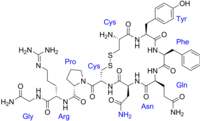
Photo from wikipedia
Chronic stress hormones promote EGFR inhibitor resistance in EGFR mutant non–small cell lung cancer. Destressing cancer with β-blockers Common wisdom holds that stress is not good for cancer patients, but… Click to show full abstract
Chronic stress hormones promote EGFR inhibitor resistance in EGFR mutant non–small cell lung cancer. Destressing cancer with β-blockers Common wisdom holds that stress is not good for cancer patients, but it can be difficult to avoid considering that both the diagnosis of cancer and the associated treatments are quite stressful for the mind and body. Nilsson et al. investigated this phenomenon in non–small cell lung cancer, providing insights into the underlying mechanism and a potential intervention. The authors found that stress hormones activate β2-adrenergic receptors on cancer cells, activating a signaling cascade that promotes tumor resistance to EGFR inhibitors, a key therapy for this disease. Conversely, β-blockers—a common class of drugs used in humans—blocked this mechanism of resistance and may become a useful adjunct to lung cancer therapy regimens. Epidermal growth factor receptor (EGFR) tyrosine kinase inhibitor (TKI) resistance mediated by T790M-independent mechanisms remains a major challenge in the treatment of non–small cell lung cancer (NSCLC). We identified a targetable mechanism of EGFR inhibitor resistance whereby stress hormones activate β2-adrenergic receptors (β2-ARs) on NSCLC cells, which cooperatively signal with mutant EGFR, resulting in the inactivation of the tumor suppressor, liver kinase B1 (LKB1), and subsequently induce interleukin-6 (IL-6) expression. We show that stress and β2-AR activation promote tumor growth and EGFR inhibitor resistance, which can be abrogated with β-blockers or IL-6 inhibition. IL-6 was associated with a worse outcome in EGFR TKI–treated NSCLC patients, and β-blocker use was associated with lower IL-6 concentrations and improved benefit from EGFR inhibitors. These findings provide evidence that chronic stress hormones promote EGFR TKI resistance via β2-AR signaling by an LKB1/CREB (cyclic adenosine 3′,5′-monophosphate response element–binding protein)/IL-6–dependent mechanism and suggest that combinations of β-blockers with EGFR TKIs merit further investigation as a strategy to abrogate resistance.
Journal Title: Science Translational Medicine
Year Published: 2017
Link to full text (if available)
Share on Social Media: Sign Up to like & get
recommendations!